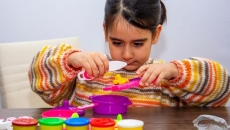With autumn rolling into the year, it’s time for back to school – not just for kids, but for parents, too! With digital integrations revolutionizing so many conventional aspects of schooling, parents’ involvement in their children’s education has become of the utmost importance.
Here are 7 action steps parents can take to play a more active role in their child's education and better students’ chances at success:
- Read Newsletters: One of the first touchpoints between parents and schools is written communication in the form of a physical newsletter or an email blast. Ensure you are signed up for any online communication and ask your child if any newsletters have been handed out. These contain upcoming important dates, policy changes, and essential information regarding any health protocols.
- Show Up: A child will often cherish memories of their parents being there – sharing words of encouragement right before a soccer game or cheering the loudest at the school talent show. Leaving work early for a day may not move the needle as much for parents but can be quite impactful for a child who sees a familiar face in the audience. Being there for orientations, science fairs, school competitions, and bake sales can go a long way. Showing up also means meeting other parents, building a community, and supporting all students. Depending on teacher preferences, volunteering in your child’s class, and offering a helping hand for a class field trip is also a great idea.
- Help with Homework: As simple as this sounds, it is valuable to keep in touch with the academic subjects your child is learning about, especially in lower grades. If your child is feeling stuck, offer to help them yourself, search for answers online, or look for other resources. However, homework help is not just confined to tackling the worksheets. It is crucial to demonstrate a positive view on education, be it by setting aside a quiet study space or encouraging good habits such as reading.
- Lend an Ear: Listening is powerful. Your children may have more to share than just test scores. Ask questions about their experiences in school, their friends, teachers, and everything in between. The key lies in not being intrusive and creating a judgement-free, comfortable space, in which kids do not fear to share. This boosts confidence, brings up the opportunity to collaborate on tackling obstacles, and enhances children’s mental health. Given that health is a priority, listen when your child complains of any sickness and help keep the school community safe by performing daily health checks.

- Talk to the Teacher: Ensure that your child’s teacher has your contact information and that you have theirs. Ask the teacher what the preferred mode of communication is – call, text, email – especially if an issue arises or if you’d like to know progress updates. Know that the teacher spends significant time with your child, making it important that parents and teachers have consistent communication to enable students to succeed. Do not miss parent-teacher meets and reschedule if you are unable to make the day. We may miss (good or bad) signs as parents that teachers are more likely to see in a school environment. As parents, never be afraid to voice your child’s needs and approach teachers with a collaborative, solution-oriented attitude.
- Join Parent Organizations: The Parent Teacher Association (PTA) or the Parent Teacher Organization (PTO) is a great tool to stay informed and directly make a difference in your child’s education. While the leadership team may be elected and only a handful of parents hold executive roles, all parents should know about the committee and contribute to events, while staying in the loop for important discussions and decisions. If you are not able to join in person, virtual attendance may be an option, or you can ask the notes to be sent afterwards.
- Lead by Example: It is super important to demonstrate a positive view of education at home. Involvement in your child’s education is not constrained within the boundaries of schools. Rather, active involvement extends to the home. Parents need to become role-models, embodying and communicating positive larger values and attitudes regarding education and the hopes, dreams, and expectations of both themselves and their children. Not only does communicating these values motivate children to be persistent when faced with challenging educational tasks, but fosters skill sets, at home, which are directly transferable to schooling. For example, creating a home environment where punctuality is valued encourages children to practice the same at school.
With formative years spent in school, this time holds high significance in your child’s life. By taking an interest and coming across as an involved, proactive parent, you are acting as a positive role model. Don’t forget that you are of equal importance in the powerful trio of education: students, teachers, and parents!






